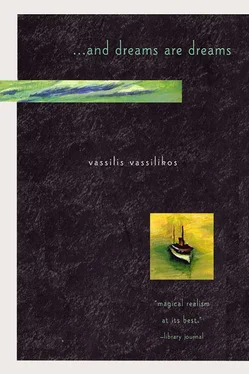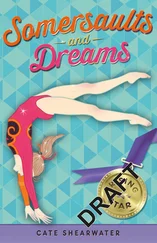I repeat, however, that life is not at all like a novel. Most of the time — and that’s the trouble — life goes on. She calls on you every day to prove to yourself what your life’s goal is. Of course, there are escape routes, artificial gardens of Eden. But for the most part, escape is not a solution. And we have to keep on living our lives on a basis that is not at all pleasant. That is literally what was happening in my case.
Rosa’s visit had released sources of energy inside me, but after she left I fell back into my familiar rut: work, work, work, then perhaps an evening out, a movie, alone, alone, alone. And then one afternoon I thought I’d go and see my friend Federico, from whom I had been concealing the fact that I was in town until I could be sure I was being productive. He was thrilled to see me, and insisted we go out to dinner that evening.
We went out. Two other Italians, also antique dealers, came along with us, as well as a woman, Ursula, who didn’t seem to be with any of the three men. In fact, all three men were clearly not interested in women, but as Federico was very fond of me, it seems he had invited the young woman in an effort to play matchmaker, since, when I had visited him at his shop that afternoon, I had told him that I was traveling alone.
We went to a trattoria that looked like a movie set, with lit torches in hollows in the walls. It was an ancient Roman tomb that had been turned into a restaurant. There, Federico, who was truly happy to see me, having had a drink or two, loosened up and brought up his favorite topic, all the rage in Italy at the time: organ transplants. He started by protesting television that revealed the name and sex of the donor, which in Federico’s opinion was unnecessary: the patient didn’t need to know whose heart or kidney he was receiving. He went on to say that at that very moment, from one end of his oblong country to the other, from Aosta to Taormina and from Taranto to Sardinia, ambulances were carrying organs in special containers, by sea, by air, by rail, and by DHL, transversely, diagonally, vertically, and horizontally, human organs from the dead, destined for the living.
At dessert, after an abundant meal, he concluded by saying that nowadays, the way medical science has progressed, nothing is thrown away. Except perhaps the nails and the hair. His way of saying all this, by generalizing and poking fun at it, made him laugh first and then (they do say that laughter is as contagious as a head cold) his laughter spread to the others and to myself. I began to laugh hysterically, like a fool, at that
“non si butta niente” (“nothing is thrown away,” as they say about a good piece of beef). By the end of the evening we were all in hysterics, thinking up preposterous transplants, like, for example, a doctor friend of mine in Patras who, while we were college students, wanted to change people’s heads. (Actually, he is now a successful neurosurgeon and he still cuts them open like watermelons.) The madness of one era that becomes the logic of another; isn’t that what progress is?
Every phenomenon has its own place and time. In Italy, as I have said, the papal ban had just been lifted, so while up to that point Catholics had been going to other countries to receive transplants, suddenly there was a transplant boom, just as there had been a building boom in Athens when it was proclaimed the capital of the newly established Greek state. Every day, the lead item on television news programs was a successful transplant. Hospital telexes were constantly sending and receiving information about available organs: clinics were competing to see who would come first in this race against death, while the Road Safety Service set up a medical department to deal with the organs of traffic accident victims. It was only natural, therefore, that our small group, as well as all the other customers of the trattoria, that extomb, would be discussing, as I could hear them doing at neighboring tables, the same current event. Everyone that is except for Ursula, the only woman in our group, who seemed to suffer because of this conversation. She laughed along with us, or at least pretended to laugh, in order not to stand out, but every so often she would say, like a chorus: “What a macabre topic!” (It is the same word in all Greco-Latin languages: macabro, macavrios, macabre.) Federico had warmed up with the wine and was now telling the story about the Carabiniero (Italians joke about the Carabinieri the way Greeks joke about the Greeks from the Caucasus), a mountain of a man, who is living with the transplanted heart of a woman and whose behavior has become effeminate (this is what amused Federico). So we laughed and laughed with the high-pitched voice of the Carabiniero on duty.
Here is a story I would tell with pleasure, I said to myself. The spark of the comic element, which I had overlooked, seemed like a lifesaver for me, trying as I was, to write in voluntary isolation, but finding only annoyance with the telegraph wire, annoyance with the telephone, annoyance with my life in general, which was scattered and disorganized and stupid. Cooped up in a hotel room, after the failure of two previous attempts, two notebooks, and now this third one, where the narration, scattered, disorganized, stupid, goes on the same way my life goes on. But I did say so in the beginning: this text speaks of the failure of the narration, not of the narration itself. That had been my plan from the start.
One might come away from an evening out with friends, especially if they are pleasant, with an entire book in one’s head. However, more often than not, one comes away escorting a woman, and while you can do whatever you want with a book, with a woman, a person distinct from yourself, after a while you might not know what to do. She attaches herself to you and becomes an imposing plane tree that cools you with its foliage and sheds its leaves poetically in the fall, but never budges.
That isn’t exactly what happened with Ursula.
That evening, Ursula, fed up with the stories of our little group (which, I should point out, did not pay her the slightest attention, although she was young and beautiful and not the much older, much less attractive type of woman toward whom gay men tend to
gravitate), asked me if she could share a cab with me.
She said she lived near my hotel; a lie, as I was to discover later, but far from an unpleasant one for me.
Federico laughed as he saw us leaving together. His matchmaking had been a success.
In the taxi, I took her hand tenderly in mine.
“So you’re not one of them?” she remarked slyly.
“Do I look like I am?” I asked.
“Nowadays, you never can tell….”
It was clearly an invitation to find out more.
But when we arrived at the hotel, the night watchman, not the regular one, who was my friend, but his replacement, made me furious. He asked Ursula for identification papers. She had no papers on her. He insisted that he couldn’t let her spend the night in my room. Not to mention that the rate of the room would have to go up.
“All right,” I said. “We’ll pay. What business is it of yours?” I suppose he was jealous, that dirty old Italian, because I’d landed myself with such an attractive woman, and so he was giving me a hard time.
“The police, you see… they don’t allow us… the Red Brigades….”
Ursula told me later that she had felt more and more like a prostitute under the watchman’s gaze. For my part, I kept explaining that I lived there on a regular basis, but that he didn’t happen to know me because he wasn’t the regular watchman. Finally, it was all settled with a Visa credit card that Ursula fortunately had in her bag and with which she paid for the room, thereby entering her name in the hotel register.
Читать дальше












